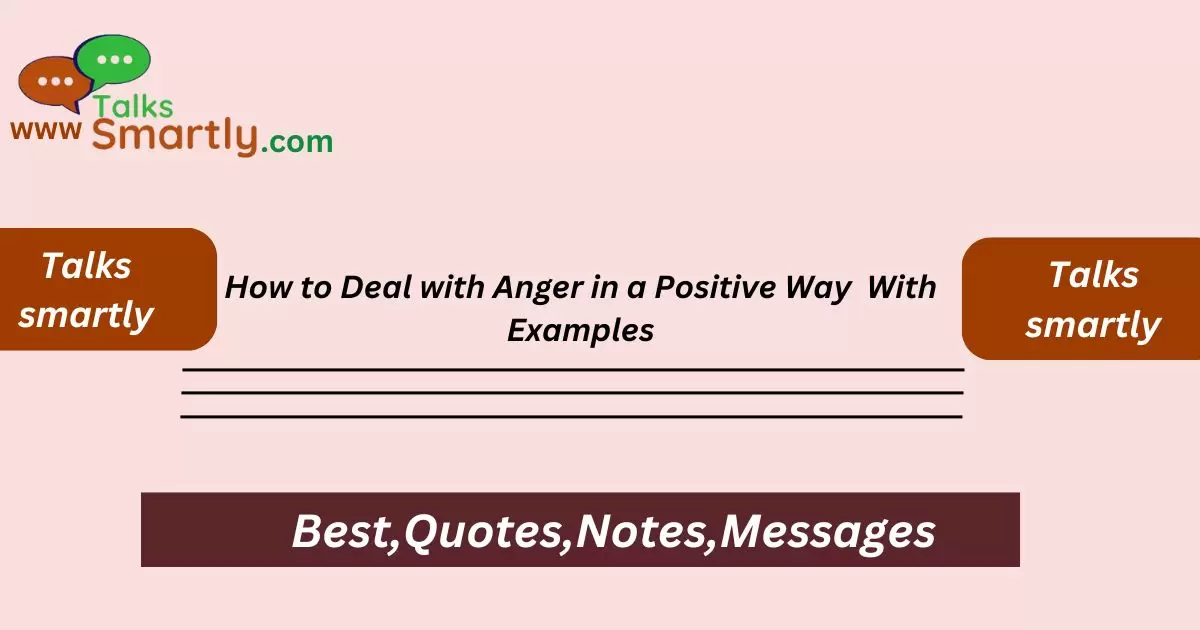Introduction
Manage anger positively by staying calm, listening actively, and offering solutions. Practice relaxation, empathy, and effective communication to improve relationships.
Anger is a natural emotion that everyone experiences from time to time. While it’s normal to feel angry, it’s important to manage anger in a positive and constructive way. Learning how to handle anger effectively can improve your relationships, reduce stress, and lead to a happier, healthier life.
In this article, we will explore various strategies for dealing with anger, providing practical examples to help you apply these techniques in your daily life.
Stay Calm

Staying calm is the first and most crucial step in dealing with anger. When you feel your anger rising, try to take a moment to breathe deeply and count to ten. This simple action can give you the time needed to think clearly and prevent saying or doing something you might regret.
Example:
Imagine you are in a meeting, and a colleague makes a misleading statement about your work. Instead of immediately reacting, you take a deep breath, count to ten, and then calmly ask for clarification. This approach not only helps you stay composed but also allows you to address the issue rationally.
Listen Actively
When you’re angry, it can be tempting to shut down or interrupt the other person. Instead, try to listen actively. This means paying full attention to the speaker, acknowledging their feelings, and responding thoughtfully. Active listening can help defuse tension and lead to a more productive conversation.
Example:
During an argument with a friend, instead of interrupting or thinking about your next response, focus on what they are saying. Repeat back what you heard to show you understand their perspective: “I hear you saying that you felt ignored when I didn’t return your call. Is that right?”
Empathize
Empathy involves putting yourself in the other person’s shoes and understanding their emotions. By empathizing, you can better appreciate their viewpoint and reduce your own anger. This doesn’t mean you have to agree with them, but it helps in creating a connection and resolving conflicts more effectively.
Example:
If a coworker is upset because you missed a deadline, try to empathize by considering their position: “I can see why you’re frustrated. Missing the deadline affected your part of the project, and I apologize for that.”
Apologize if Necessary
Sometimes, anger arises from our own mistakes or misunderstandings. When this happens, a sincere apology can go a long way in diffusing anger and mending relationships. An apology shows that you acknowledge your part in the conflict and are willing to make amends.
Example:
After realizing you overreacted in a family dispute, approach the person and say, “I’m sorry for raising my voice earlier. I was frustrated, but that was not the right way to handle it. I hope we can talk about this calmly now.”
Offer Solutions
Instead of focusing solely on the problem, try to offer solutions. This proactive approach shows that you are committed to resolving the issue and can help shift the conversation from blame to collaboration.
Example:
If you’re angry about the way household chores are divided, suggest a new plan: “I’ve noticed we’re both stressed about chores. How about we create a schedule that splits the tasks more evenly?”
Set Boundaries
Setting boundaries is essential to protect your emotional well-being and prevent future anger. Clearly communicate your limits and expectations to others. This helps in maintaining respectful relationships and reducing the chances of conflicts.
Example:
If a friend often cancels plans at the last minute, calmly let them know how it affects you: “I understand things come up, but when plans are canceled last minute, it disrupts my schedule. Could we try to confirm plans in advance from now on?”
Take Time to Cool Off
Sometimes, the best way to deal with anger is to take a step back and give yourself time to cool off. This break allows you to process your emotions and approach the situation with a clearer mind.
Example:
During a heated argument with your partner, you might say, “I need a few minutes to cool off before we continue this conversation.” Taking a walk or spending some time alone can help you return to the discussion more calmly.
Practice Relaxation Techniques

Engaging in relaxation techniques can help you manage anger more effectively. Techniques such as meditation, yoga, and deep breathing exercises can reduce stress and promote a sense of calm.
Example:
After a long, stressful day at work, you can practice deep breathing exercises or meditation to calm your mind and release any pent-up anger. Find a quiet space, close your eyes, and focus on your breath.
Use Humor
Humor can be a powerful tool in defusing anger and lightening the mood. By seeing the funny side of a situation, you can reduce tension and approach conflicts with a more positive attitude.
Example:
If you are frustrated by a minor mistake you made, try to laugh at yourself. Saying something like, “Well, that’s one way to keep things interesting!” can help you and others see the situation more lightheartedly.
Seek Professional Help
If you find it difficult to manage your anger, seeking help from a professional counselor or therapist can be beneficial. They can provide you with tools and techniques to handle your emotions more effectively.
Example:
If your anger is affecting your relationships and daily life, consider booking an appointment with a therapist. They can help you explore the root causes of your anger and develop strategies to manage it better.
So He Ghosted You And Now Wants You Back: Ways To Handle It
Exercise Regularly
Physical activity can help reduce stress and improve your mood. Regular exercise releases endorphins, which are natural mood lifters, and can help you manage anger in a healthy way.
Example:
Incorporate activities like jogging, swimming, or even a brisk walk into your routine. After a stressful day, a workout can help you release tension and feel more relaxed.
Practice Gratitude
Focusing on the positive aspects of your life can help reduce anger. Practicing gratitude shifts your focus from what’s making you angry to what’s making you happy.
Example:
Keep a gratitude journal and write down three things you are grateful for each day. This simple practice can help you develop a more positive outlook and reduce feelings of anger.
Communicate Effectively
Effective communication involves expressing your feelings and needs clearly and respectfully. Avoid using accusatory language and instead focus on how you feel.
Example:
Instead of saying, “You never listen to me,” try, “I feel unheard when you interrupt me. Can we try to listen to each other more carefully?”
Practice Self-Care

Taking care of your physical and mental health is crucial in managing anger. Ensure you get enough sleep, eat a balanced diet, and take time for activities you enjoy.
Example:
Make time for hobbies and activities that relax and rejuvenate you, whether it’s reading, gardening, or spending time with loved ones. Taking care of yourself helps you stay balanced and less prone to anger.
Conclusion
Dealing with anger in a positive way is crucial for maintaining healthy relationships and personal well-being.
By staying calm, listening actively, empathizing, apologizing when necessary, offering solutions, setting boundaries, taking time to cool off, practicing relaxation techniques, using humor, seeking professional help, exercising regularly, practicing gratitude, communicating effectively, and practicing self-care, you can manage your anger effectively and turn potentially destructive situations into opportunities for growth and understanding.
Remember, it’s not about suppressing anger, but about channeling it constructively.












